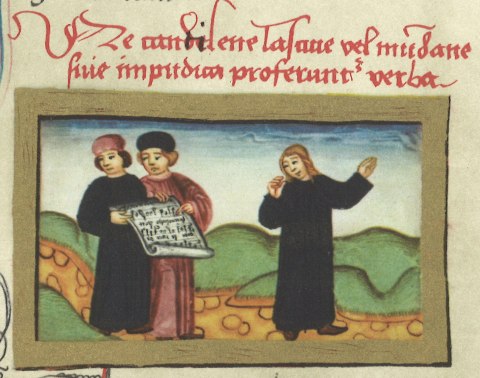H. Learning, Singing, Playing, Dancing

Fig. Singing students. „Lascivious and worldly songs or shameless words must not be performed.“ Miniature in the statutes of a college at the University of Freiburg / Breisgau, c. 1500 (Universitätsarchiv der Albert-Ludwigs-Universität Freiburg im Breisgau, Coll. Sap. 2a, fol. 35r). Two students sing an apparently secular song from a music sheet, a third student seems to be dancing. » B. Kap. Streuüberlieferung von Liedern im Kontext der Universität.
Music was indispensable as a communal practice in numerous contexts in life. The musical education of young people was still largely reserved for the monasteries, where theory lessons primarily assisted in the daily practice of chanting liturgy. In addition, however, there is much evidence of the participation of young people in public performances in the city and at court. Poor pupils earned their school fees from their participation in performances, organised by the schools, on feast days (later called ‘Kurrende’). Public events with music included the increasingly bourgeois spiritual and secular plays that assumed enormous proportions in Tyrol around 1500. The music offered ranged from sacred song and traditional plainchant to illustrative instrumental music and Satanic screams. Archival and iconographic sources provide information on the use of musical instruments in all strata of society. The Instrumentenmuseum offers an acoustic and visual panorama of musical instruments that existed in the region at the time. Dancing was popular among all classes but was suspected in some ecclesiastical writings as the work of the devil; this hardly stopped the practice but provides valuable insights to the historical hindsight today.
The essays marked with * are not yet available online.
Jugendliche Musiker bei Hofe*
Reinhard StrohmChildren’s processions in Tyrol
Giulia GabrielliDie Tiroler Spieltradition. Musik und Tanz in geistlichen und weltlichen Spielen
Andrea GrafetstätterDie Tiroler Spieltradition. Das Sterzinger Spielarchiv
Sandra Désirée TheißTanz und Verderben. Tanzwut in Klosterneuburg
Marko MotnikCivic and courtly dancing
Helen Coffey